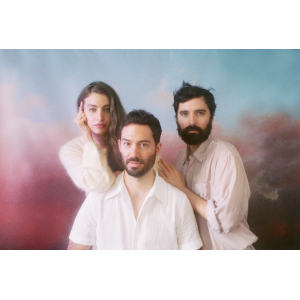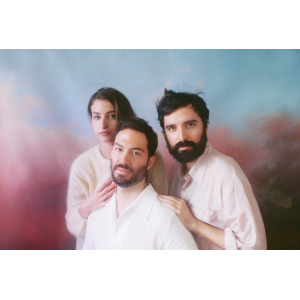Le collectif BALESTRA - CARDELLINI - GONZALEZ
Theatre company
The Collectif Balestra – Cardellini – Gonzalez received a creative grant for their show Showroom.
What is your artistic background ?
All three of us have quite different backgrounds. Since graduating from the La Manufacture - Haute École des Arts de la Scène, in Lausanne, Rébecca Balestra has been working as a performer and creating her own slam poetry solos. Igor Cardellini trained in social and political sciences and now works as a journalist in addition to co-directing our projects. His focus is on performance, power relations and the way the theatrical situation allows one to reactivate them, to put them into play. As for me, Tomas Gonzalez, I went through literary and classical studies before joining La Manufacture where I teach today. My research is focused on acting and on the processes of copying, imitation and reactivation. It is our desire to bring these worlds together that led us to create together. That, our love for Tina Turner and the need to work in a collaborative mode, where we put ourselves at the service of the forms themselves, without pre-established hierarchy or fixed roles. Alone one often has half-good ideas, and these become stronger when confronted with other views and sensibilities.
How do you view your profession today ?
One question which preoccupies us at the moment is the place that culture holds in society. Obviously, using the word culture as a given is problematic. There are different types of cultural practice, which involve different social ecosystems, different working conditions and which are aimed at different audiences. The fact remains that, conflated into a single term, these practices have all been treated as inessential by politics. What is violent in this type of treatment is that it makes real what was initially improperly called "social distance". Because by becoming the norm, the injunction to maintain a "physical distance" became a real "social distance" between people. Now, for us, contemporary theater and performance have a potentially powerful reunifying, emancipatory, even subversive power. So of course, the audiences of these practices are not socially neutral; most of the time they attract small worlds that gravitate around them. But gathering around a theatrical object can also be an opportunity to look differently, together. To remember that the world is socially constructed, that the rules and norms that govern it are not immutable, that all this moves and that we can play with it, not only be affected by it, sometimes even change it.
Where do you see yourself in 5 years ? In 10 years ?
Together, or not. But in contexts where we will have reinforced and extended the spaces that we have created for ourselves to enter into dialogue with audiences, to share forms, to feel the world, to question it. In societies where support for training, production and financing systems will not have been questioned. Where they will be valued with the aim of guaranteeing decent working conditions to artists and all the professions that allow the living arts to exist.
Interview conducted in 2021
Photography credit: Julia Grandperret


